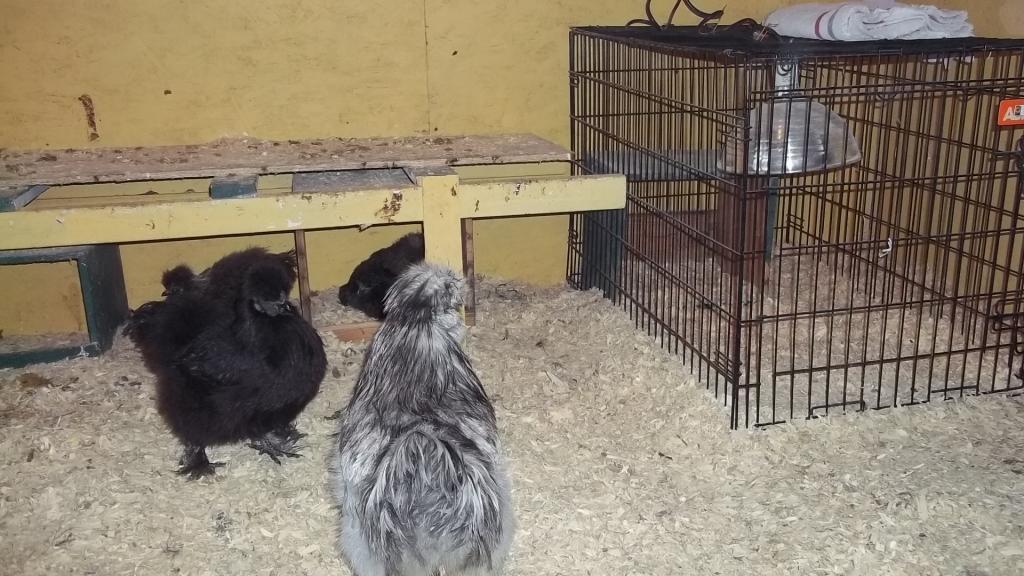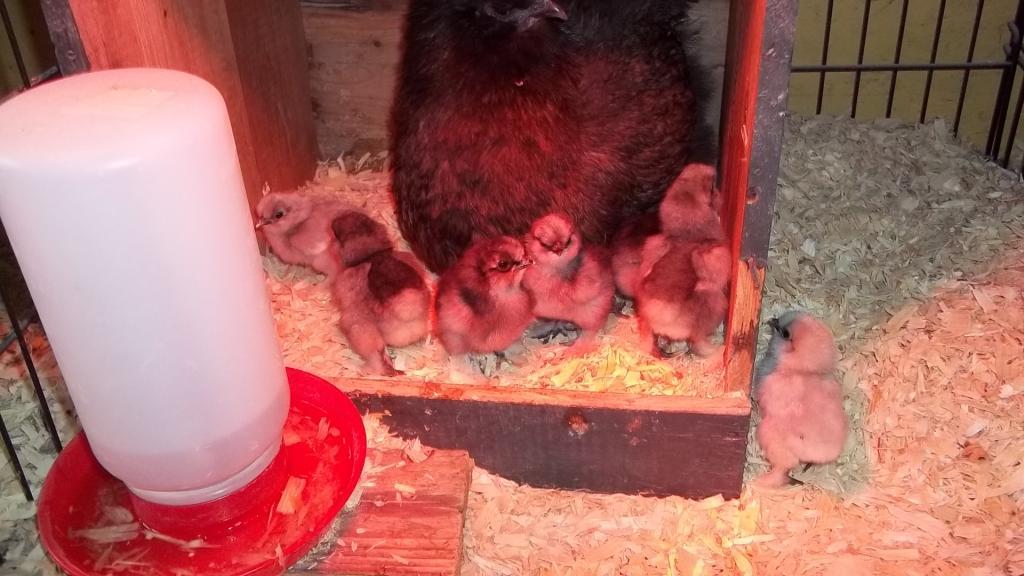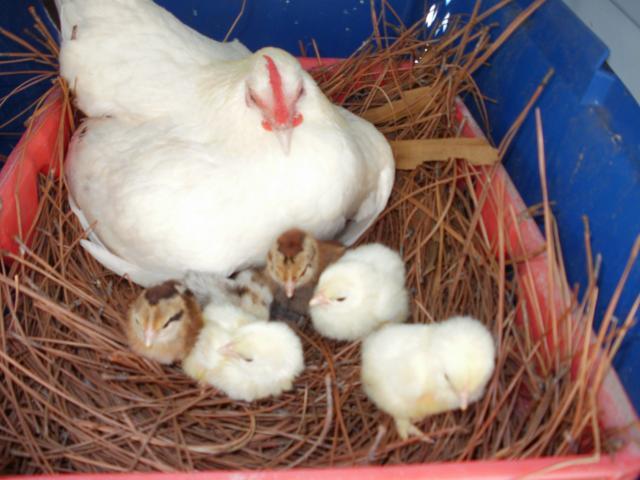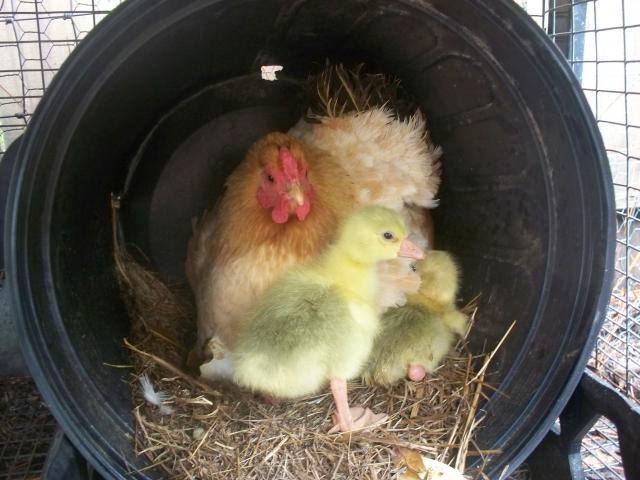I went out this morning to give them their oatmeal, like every morning, and one of my girls did not come running. Since she is usually right by my feet when there's food involved, I looked for her. My dog found her 10 minutes later, under the woodpile, sitting on about 20 eggs. I thought that the egg production was down because there is a lot less light in Massachusetts these days, guess I was wrong. So, since to me this seems to be brooding behavior, do I let her sit on some eggs or keep taking them away from her? All but two of the ones she was sitting on had frozen and cracked, but I can give her some from the other girls if it's a good idea to let her set on them. Never had a broody hen before, so have no idea what to do here. I have a set up on the porch for anyone who is in need of isolation for whatever reason, so it wouldn't take more than a minute to tuck her in there with her eggs and let her go at it, but should I? Any ideas or suggestions? It's way too cold here to let her sit under the woodpile, so it's either move her and let her do it or keep taking them away from her and tossing her back in the run. And she seems pretty determined.
Navigation
Install the app
How to install the app on iOS
Follow along with the video below to see how to install our site as a web app on your home screen.
Note: This feature may not be available in some browsers.
More options
You are using an out of date browser. It may not display this or other websites correctly.
You should upgrade or use an alternative browser.
You should upgrade or use an alternative browser.
broody question, help please
- Thread starter mamadukes5
- Start date
More options
Who Replied?Its really up to you. Do you have a place to keep the hen and the chicks when they hatch? If so, go for it. Give her new, fresh eggs all at once. It will be easier to move her after dark. She'll do most of the work. Let us know what you chose.


I had my first broody last year and I've found that a broody hen is a very valuable thing.
I have a nice incubator and a good brooder box set up but having the hen do all the work is so much better.
She cares for them completely, all you have to do is ensure food and water is available like you would do anyway.
Also the hen raised birds are so much friendlier than the incubator and brood box raised ones are.
My advice is to get her a clutch of fertilized eggs (any breed just get them under her ASAP) then enjoy the experience and reap the profits.
I have a nice incubator and a good brooder box set up but having the hen do all the work is so much better.
She cares for them completely, all you have to do is ensure food and water is available like you would do anyway.
Also the hen raised birds are so much friendlier than the incubator and brood box raised ones are.
My advice is to get her a clutch of fertilized eggs (any breed just get them under her ASAP) then enjoy the experience and reap the profits.
I think it's ideal to keep a broody in a separate & secure cage for her own protection and to insure a successful hatch. There is a risk that she won't want to stay setting in the new location, but more risk of predation or disturbance if she stays there.
Get the isolation cage set up with fresh bedding, food & water and wait until after dark to move the hen and the uncracked/unfrozen eggs. Try to make the move as smooth as possible, if you can fit a box in the cage put the bedding in there and bring the box to her nest by the woodpile and move her right there, then carry the box back to the cage. Cover the cage with something to keep it dim for a few days to insure a successful move.
If you already have some fertile eggs go ahead and use them in her new nest. Otherwise she can stay on those two eggs until you get more. If you do give her new eggs you'll have to remove those two, it's best if all the eggs will hatch on the same day. Make all the changes after dark for best success.
The new family will need a separate place to live until the chicks have gotten feathered. Your hen may be ready to leave the chicks anywhere from 4-12 weeks and the chicks will need to grow together until they're adults before you should integrate them with the flock.
And of course, have a good plan in mind for all the extra cockerels that are certain to hatch.
Get the isolation cage set up with fresh bedding, food & water and wait until after dark to move the hen and the uncracked/unfrozen eggs. Try to make the move as smooth as possible, if you can fit a box in the cage put the bedding in there and bring the box to her nest by the woodpile and move her right there, then carry the box back to the cage. Cover the cage with something to keep it dim for a few days to insure a successful move.
If you already have some fertile eggs go ahead and use them in her new nest. Otherwise she can stay on those two eggs until you get more. If you do give her new eggs you'll have to remove those two, it's best if all the eggs will hatch on the same day. Make all the changes after dark for best success.
The new family will need a separate place to live until the chicks have gotten feathered. Your hen may be ready to leave the chicks anywhere from 4-12 weeks and the chicks will need to grow together until they're adults before you should integrate them with the flock.
And of course, have a good plan in mind for all the extra cockerels that are certain to hatch.
This is what my broody went into,Ihave a heat lamp for the chicks and the water is under that to keep it from freezing.


And here they are


Last edited:
- Thread starter
- #8
thanks for all the responses, I appreciate it. I moved the eggs once she went back in the run, and she is not happy with me now. She came back out, went right to that spot, and started squawking something fierce. She stayed under there shouting for a good 10 minutes, then came out, followed me around the yard and yelled some more. I couldnt leave them there though, so she'll have to get over it. I'm going to follow your suggestions once I see how she acts over the next couple of days. If she seems determined to go broody, I have my small house sitting empty since dh built me a bigger one, so if she wants to hatch some, I can put her and whatever she hatches in there once they are feathered. And I have a dog crate set up much like the one in the pic that will hold her while she's sitting on them. Never had a broody hen, so if she decides to go that route, I'll be asking lots of questions. She's actually one of my most mild-mannered hens, doesn't mind being picked up, ignores my dogs like they don't exist, and twice a day comes to the back door for treats if I don't get out there fast enough. She'd probably be a pretty good brooder. The temperature has me worried, but will see how she acts and go from there. Thanks again for the advice, Lord knows I need it.
The reason I have chicks this time of year is I had two broodies that I could not break,so they hatched out to get over it,I would lnever do this in the winter on purpose
I've had (and currently have) hens brood & raise chicks in the winter. Of course I'm in Florida, but we still get some frosts & freezes that these hens & chicks don't seem to mind. I've seen other folks let their hens brood in colder climates too. It's up to you.
Most broody hens do not like to be moved or have their nests disturbed. That's why it's best to make their changes after dark, when they are more oblivious to the world around them. Make the move as seamless as possible, if she's already in a container that can be moved then pick the whole thing up, hen, eggs & all. If not, bring a container to the nest and move the hen into that before carrying it to her new quarters.
I like these plastic soda crates lined with straw, this one was in a dog crate:

Or with a plastic nursery pot on its side inside the soda crate, this is my bantam Biscuit with 2 goslings she hatched & mothered:

I keep my broodies confined to a cage or small pen. After their move I will cover the sides with sacks or cardboard so the lighting remains dim and they are less aware that they've been moved, and they can concentrate on their egglings. After a few days the covers can be removed.
Some hens won't tolerate being moved at all, but most will take to their new location if the above steps are followed.
Most broody hens do not like to be moved or have their nests disturbed. That's why it's best to make their changes after dark, when they are more oblivious to the world around them. Make the move as seamless as possible, if she's already in a container that can be moved then pick the whole thing up, hen, eggs & all. If not, bring a container to the nest and move the hen into that before carrying it to her new quarters.
I like these plastic soda crates lined with straw, this one was in a dog crate:

Or with a plastic nursery pot on its side inside the soda crate, this is my bantam Biscuit with 2 goslings she hatched & mothered:

I keep my broodies confined to a cage or small pen. After their move I will cover the sides with sacks or cardboard so the lighting remains dim and they are less aware that they've been moved, and they can concentrate on their egglings. After a few days the covers can be removed.
Some hens won't tolerate being moved at all, but most will take to their new location if the above steps are followed.
Similar threads
- Replies
- 7
- Views
- 531
New posts New threads Active threads
-
Latest posts
-
-
-
Open Contest Cutest Couples Photo Contest—Poultry Edition
- Latest: Paradisewife
-
-
-
-
Latest threads
-
-
Cleaning chicken nose
- Started by shortishdial
- Replies: 0
-
-
-
-
-
Threads with more replies in the last 15 days
-
-
Open Contest Cutest Couples Photo Contest—Poultry Edition
- Started by Lacy Duckwing
- Replies: 115
-
BYC's 52-week Photography Challenge. Week 1: (Jan 5-11, 2026). Theme: SUNSET
- Started by azurbanclucker
- Replies: 105
-
BYC's 52-week Photography Challenge. Week 2: (Jan 12-18, 2026). Theme: Flock Star
- Started by Lacy Duckwing
- Replies: 84
-
Favorite Chicken Breed?
- Started by urlocalcrazychickenlady
- Replies: 76
-
×



